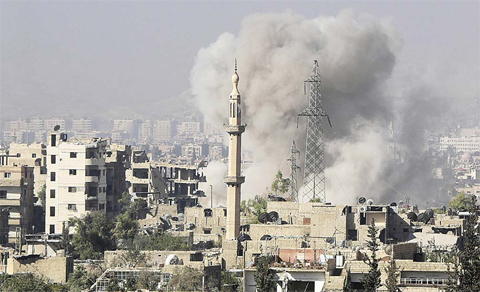 Syrian regime bombings on rebel positions in Jobar, in eastern Damascus
Syrian regime bombings on rebel positions in Jobar, in eastern DamascusANKARA: Turkey and Saudi Arabia yesterday warned Russia over the consequences of its intervention in Syria, with Ankara telling Moscow its bombing campaign in support of the regime was a "big mistake". The two majority Sunni Muslim powers both support the moderate opposition in Syria and have been infuriated by Moscow's bombing campaign to prop the regime of President Bashar Al-Assad.
Ankara is particularly concerned over claims-denied by Moscow-that its bombing campaign has targeted anti-Assad rebels rather than the stated aim of Islamic State (IS) jihadists. "Saudi Arabia and Turkey are in agreement on supporting the opposition in Syria. What is important is a political solution," Jubeir said.
Russia push
Regime forces backed by Russian air strikes pushed an offensive in central Syria yesterday as President Vladimir Putin slammed Washington for not working with Moscow on the conflict.
Russian warplanes launched at least 15 air strikes to support government troops as they began a new operation just north of the city of Homs, a monitoring group said. Syrian state television, citing a military source, said the army had begun a military operation in the north and northwest of Homs province "with the goal of restoring security and stability to the villages and towns in the area".
"Russia is making a big mistake," Turkish Foreign Minister Feridun Sinirlioglu told reporters after talks in Ankara with Saudi counterpart Adel Al-Jubeir.
"What it does will bring no meaning or benefit, other than delaying the transition process to help Syria out of the chaos," he added. "We will continue with our warnings."
"We are in agreement that there will certainly be no role for Bashar Al-Assad," he added. He said that in recent talks with top Russian officials, Riyadh had told Moscow that the Syria crisis should be solved according to the 2012 Geneva communique which envisages a political transition in Syria.
"We (in Ankara) discussed the intervention of foreign powers, especially the Russian intervention which is a very critical issue and could lead to foreigners intervening in Syria from the outside," Jubeir said. Their united opposition to the Russian bombing campaign has intensified a rapprochement between Turkey and Saudi Arabia that has gained pace over the last months.
Riyadh and Ankara fell out badly over Saudi's support of the toppling by the Egyptian army of Egyptian president Mohamed Morsi in 2013 who Turkey has strongly supported.
But in a sign of warming ties, President Recep Tayyip Erdogan strongly defended Saudi Arabia against vehement criticism from within the Islamic world over the deaths of hundreds of pilgrims at a stampede during the Hajj pilgrimage.
The Syrian state television said the regime forces had taken control of one village north of the city. The Syrian Observatory for Human Rights, a Britain-based monitor, reported at least 10 people, six of them rebels, had been killed in a barrage of Russian air strikes in the area. The Homs offensive is the latest joint operation between Syrian ground forces and Russian warplanes since Moscow began an aerial campaign on September 30. The latest fighting appears intended to secure the main highway that leads from Homs to neighboring Hama's provincial capital Hama city.
The two cities are fully or almost-fully controlled by the Syrian government, but opposition forces including moderates, Islamists and Al-Qaeda affiliate Al-Nusra Front, control territory in between. "The operation will continue until it reaches its goal of securing northern Homs and severing contacts between militants in Hama and militants in Homs," a military source told AFP.
Syrian troops have in recent days also been pushing a military operation in northern Hama province and the Sahl Al-Ghab region between Hama, Latakia and Idlib provinces.-AFP









